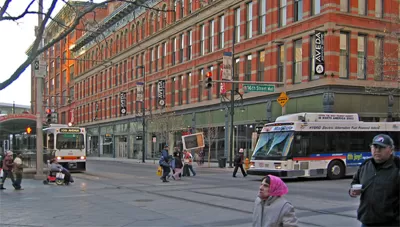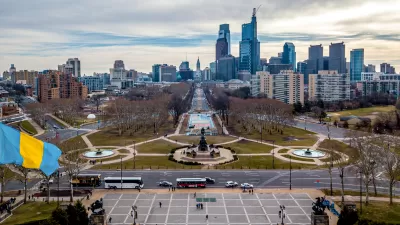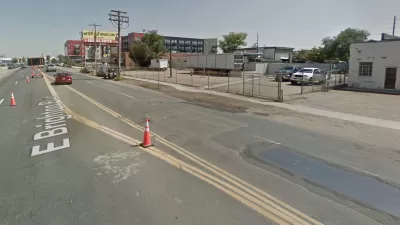Denver is considering a new city department in response to concerns expressed by bike and pedestrian advocates about the implementation of long-term plans.

"Denver voters this November could get a say in renaming the city’s public works department as part of a long-coming revamp that is putting more emphasis on boosting transit and other mobility options," reports Jon Murray.
Murray adds more specifics about the proposal to revamp the city's Department of Public works: "Mayor Michael Hancock on Tuesday announced his proposal to create the Department of Transportation and Infrastructure via a charter amendment that would cement a nearly two-year reorganization effort. It also would redirect the focus of the department after complaints from bike and pedestrian advocates that the city has been slow to implement its long-term plans."
The decision to create a new city department will require the approval fo voters, but there is one more election that will determine the future of the proposal: whether Mayor Hancock is re-elected in a citywide election scheduled for May 7.
For more background on the two-year process of rethinking the Denver Department of Public Works, see earlier coverage from September 2018, written by Andrew Kenney.
FULL STORY: Mayor Michael Hancock pitches November vote on new Denver department promoting “transportation equity”

Trump Administration Could Effectively End Housing Voucher Program
Federal officials are eyeing major cuts to the Section 8 program that helps millions of low-income households pay rent.

Planetizen Federal Action Tracker
A weekly monitor of how Trump’s orders and actions are impacting planners and planning in America.

The 120 Year Old Tiny Home Villages That Sheltered San Francisco’s Earthquake Refugees
More than a century ago, San Francisco mobilized to house thousands of residents displaced by the 1906 earthquake. Could their strategy offer a model for the present?

HSR Reaches Key Settlement in Northern California City
The state’s high-speed rail authority reached an agreement with Millbrae, a key city on the train’s proposed route to San Francisco.

Washington State Legislature Passes Parking Reform Bill
A bill that would limit parking requirements for new developments is headed to the governor’s desk.

Missouri Law Would Ban Protections for Housing Voucher Users
A state law seeks to overturn source-of-income discrimination bans passed by several Missouri cities.
Urban Design for Planners 1: Software Tools
This six-course series explores essential urban design concepts using open source software and equips planners with the tools they need to participate fully in the urban design process.
Planning for Universal Design
Learn the tools for implementing Universal Design in planning regulations.
Ada County Highway District
Clanton & Associates, Inc.
Jessamine County Fiscal Court
Institute for Housing and Urban Development Studies (IHS)
City of Grandview
Harvard GSD Executive Education
Toledo-Lucas County Plan Commissions
Salt Lake City
NYU Wagner Graduate School of Public Service





























